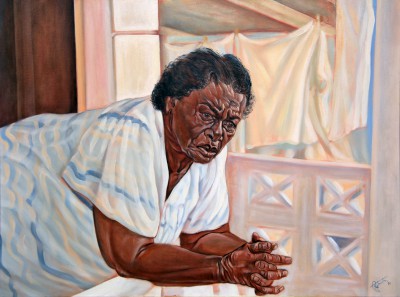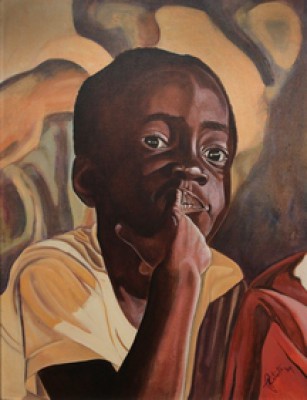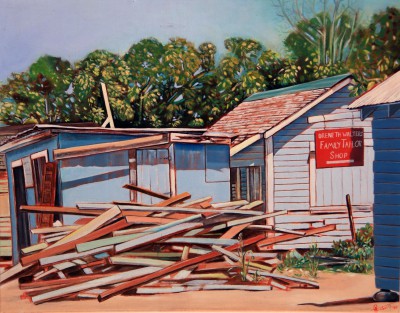Antonius Roberts: Faces of Familiar Strangers
03/24/2011-04/21/2011
My motivation for this exhibition was prompted by a desire to achieve
three things: I wanted to show some of my early work not seen publicly since
the 80’s; to draw attention to the blight of poverty which is, unfortunately,
still relevant in today’s society; and to pay tribute to those loyal collectors
of Bahamian art during the 1980‘s.
The works on display are from the private collections of Lowell
Mortimer, Max and Allyson Gibson, Campbell and Sharon Cleare, Dr. Ronald and Gwen
Knowles all of whom offered their patronage in those early years to several
emerging artists, of which I was one.
They continue to give their enduring encouragement and support and I am
grateful.
The comment from Alissandra Cummins’ review for the ‘Emerging Artists
in the Caribbean’ Exhibition in Nagoya, Japan clearly attests to the motivation
that prompted these portraits. “Antonius
Roberts’ canvasses represent portraits of human emotion and condition. The viewer’s initial response is to the impact
of his powerful images of men and women; slightly enlarged heads filling the
canvas amplifies the immediacy of human expression. The artist’s portraits are forceful and yet
poignant commentaries on Caribbean society.”
It was and is my belief that one of my responsibilities as an artist
is to be the ‘story-teller’ - to create a visual history which honestly
reflects the many aspects of the society in which we live. The inspiration for these evocative portraits
sprang from a desire to explore the differences of circumstance between the
various layers of Bahamian society. The
meaning or lack of it in the lives of the ‘have nots’, the harsh condition of
their living and the substance of their lives.
It was my intent to capture the hidden emotions and tell the stories
etched in the lines of each face. These
are portraits of people who each have
their own unique character yet are joined, at that level of existence,
by the common thread of material deprivation.
At the same time, I questioned whether they were able to accept the
hardships and restrictions of their lives and in spite of them would do
whatever it took, with a degree of equanimity, to provide for their families.
Could they build and sustain an emotionally and spiritually satisfying life or
would a sense of resentment or hopelessness grind them down and prevail with
the certain knowledge of the discrepancies between their lives and the lives of
the more fortunate.
I attempted in these works to bring into focus the divisions and
realities prevailing in our society and which form part of the fabric of our
history. I hope that I have depicted
accurately and with compassion the complex mixture of emotions written into these faces; hope and
hopelessness; meaning and purpose, or the lack of it; weariness and the need
for comfort that may or may not have been forthcoming.
Above all I hope that the enduring strength and
the dignity of my fellow Bahamians is faithfully reflected in my work.



